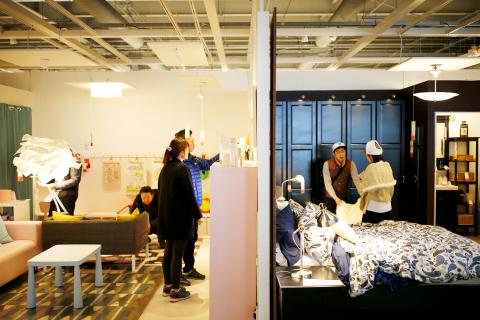IKEA was onto something when it opened its first South Korean store, its largest anywhere, in late 2014.
Home furnishing chains are a bright spot in a sluggish South Korean economy, tapping demand from the rising share of people who are living alone and spending more to make their dwellings attractive and comfortable.
Local market leader Hanssem Co Ltd, with sales of more than US$1 billion in 2014, saw a 31 percent increase in revenue for the first nine months of last year and a doubling in its share price for the year as it opened 27 of its larger stores in 2014 and last year. Shinsegae Co Ltd’s Jaju chain opened 10 stores last year, bringing its total to 149.

Photo: Reuters
Swedish giant IKEA, whose single store on the outskirts of Seoul generated US$260 million in its first year, expects to spend 1.2 trillion won (US$997 million) to open five more South Korea stores by 2020 — one more than earlier planned.
South Korea is following a path seen in the US and Japan, with people spending more on home decoration as per-capita GDP rises, analysts say.
“Four or five years ago, people thought home decorating was only for rich people,” said Ock Soo, 32, who founded Webzine Rooomers and conducts decorating classes attended mostly by singles.
“Now home decoration is for everyone, as more people are living alone and for longer periods,” she said.
Home decorating shows known as “jipbang” have been proliferating on TV, including “Old House, New House” and “My Room’s Dignity,” both of which debuted in December last year.
A fast-graying South Korean population and heavy household debt, at 1.7 times annual disposable income, make property investment less attractive, prompting homeowners and renters to spend instead on making their existing dwellings more liveable. South Korea’s working-age population is set to peak this year.
“People no longer see houses as an investment, but as an object of utilization,” said Lee Gwang-soo, an analyst at Mirae Asset Securities. “People start decorating their homes because they now have to ‘live’ in them.”
Last year, South Koreans spent 12 trillion won on home interior decoration, including floors, walls, doors, kitchen and bathroom fixtures and labor, up from about 9 trillion won in 2014 and forecast to grow to 27 trillion won by next year, according to Mirae Asset Securities.
Those figures exclude furniture and off-the-shelf items, which make up the bulk of sales at retailers like IKEA and H&M Hennes & Mauritz AB’s H&M Home, and came despite economic growth that slowed to 2.6 percent last year, from 3.3 percent.
Korea Investment & Securities estimates the domestic furniture market is worth about 8 trillion won, with kitchen items counting for another 3 trillion to 4 trillion won.
The share of single-person households in the country rose to an estimated 27 percent last year from 20 percent in 2005, according to Statistics Korea, and is forecast to reach 31 percent in 2025 as younger people delay getting married and having children in the fastest-ageing industrialized country.
People living on their own spend a larger share of their incomes on consumption, including decoration.

Macronix International Co (旺宏), the world’s biggest NOR flash memory supplier, yesterday said it would spend NT$22 billion (US$699.1 million) on capacity expansion this year to increase its production of mid-to-low-density memory chips as the world’s major memorychip suppliers are phasing out the market. The company said its planned capital expenditures are about 11 times higher than the NT$1.8 billion it spent on new facilities and equipment last year. A majority of this year’s outlay would be allocated to step up capacity of multi-level cell (MLC) NAND flash memory chips, which are used in embedded multimedia cards (eMMC), a managed

In Italy’s storied gold-making hubs, jewelers are reworking their designs to trim gold content as they race to blunt the effect of record prices and appeal to shoppers watching their budgets. Gold prices hit a record high on Thursday, surging near US$5,600 an ounce, more than double a year ago as geopolitical concerns and jitters over trade pushed investors toward the safe-haven asset. The rally is putting undue pressure on small artisans as they face mounting demands from customers, including international brands, to produce cheaper items, from signature pieces to wedding rings, according to interviews with four independent jewelers in Italy’s main

CULPRITS: Factors that affected the slip included falling global crude oil prices, wait-and-see consumer attitudes due to US tariffs and a different Lunar New Year holiday schedule Taiwan’s retail sales ended a nine-year growth streak last year, slipping 0.2 percent from a year earlier as uncertainty over US tariff policies affected demand for durable goods, data released on Friday by the Ministry of Economic Affairs showed. Last year’s retail sales totaled NT$4.84 trillion (US$153.27 billion), down about NT$9.5 billion, or 0.2 percent, from 2024. Despite the decline, the figure was still the second-highest annual sales total on record. Ministry statistics department deputy head Chen Yu-fang (陳玉芳) said sales of cars, motorcycles and related products, which accounted for 17.4 percent of total retail rales last year, fell NT$68.1 billion, or

In the wake of strong global demand for AI applications, Taiwan’s export-oriented economy accelerated with the composite index of economic indicators flashing the first “red” light in December for one year, indicating the economy is in booming mode, the National Development Council (NDC) said yesterday. Moreover, the index of leading indicators, which gauges the potential state of the economy over the next six months, also moved higher in December amid growing optimism over the outlook, the NDC said. In December, the index of economic indicators rose one point from a month earlier to 38, at the lower end of the “red” light.